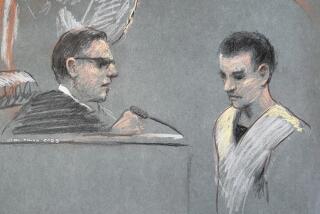Carrier’s Computer Codes Left in Open, Navy Finds
- Share via
A Navy investigation into the disappearance of 31 silver bars from the aircraft carrier Kitty Hawk has found that secret computer passwords to the ship’s supply system were left in the open. As a result, virtually any sailor had open access to the hundreds of thousands of parts and supplies stored at the Naval Supply Center in San Diego.
The probe, initiated by Rear Adm. Dennis Brooks, commander of the Kitty Hawk’s carrier group, identified at least three sailors who developed a scheme that included obtaining the computer access codes and penetrating the Navy supply system to order the silver bars, which are worth about $1,000 apiece, Navy spokesman Tom Jurkowsky said.
The report recommends that the Naval Investigative Service (NIS) reopen a criminal investigation into the roles of the three individuals and any other sailors who may have been involved. The NIS has not yet decided whether to launch a new probe, an agency spokesman said.
An earlier NIS investigation had identified two sailors in connection with the theft of the silver ingots.
Petty Officer 3rd Class Thomas Fairbanks Derrick, 32, was arrested in January, 1984, by Coronado police during a drug raid in which two silver bars were recovered. Navy investigators traced the silver bars to the batch of 31 that had vanished between June and November, 1983.
Derrick is charged with larceny, wrongfully selling three silver bars to a San Diego pawn shop, and “bringing discredit” to the armed services. Navy prosecutors are appealing an August ruling by a military judge that barred key witnesses from testifying against Derrick because the government lost tape recordings of statements they made during a preliminary hearing.
The second suspect, 3rd Class Machinist’s Mate Mark Johnson, faces a military investigation hearing on Thursday into charges of larceny and wrongful disposition of $5,000 worth of silver bars.
The Navy did not identify the three sailors in the most recent probe.
The investigation found that Navy personnel aboard the Kitty Hawk failed to observe security requirements in the area where the supply computer terminals are kept.
“People could walk into a room and see the computer codes on a desk table,” said one Navy source. “The access codes were left lying out.”
With the secret passwords in hand, sailors were able to place orders for the silver bars and receive them on board the ship, even though the ingots are used for electroplating purposes and do not belong on aircraft carriers.
Supply officers aboard the Kitty Hawk began asking questions about the bars in September, 1983, when they stumbled upon five of the silver plates. A Navy search found that a total of 31 silver bars were ordered between July and September, 1983, from computers aboard the Kitty Hawk through a large military supply depot in Mechanicsburg, Pa.
In an unrelated case, seven persons were arrested in July for allegedly stealing sensitive F-14 aircraft parts off the Kitty Hawk and shipping them to Iran.
On Tuesday, the Navy acknowledged that its supply system was plagued by widespread problems and announced that it was halting most purchases by officers aboard ships. The estimated $300 million a year in supply purchases will be shifted to shore facilities.
Commodore James B. Whittaker, the supply system’s assistant commander, told a congressional subcommittee that a separate internal investigation found that “we are vulnerable” to manipulations of the system’s computers by corrupt insiders.
As a result of the silver bars investigation, safeguards are now in place on the Kitty Hawk and at the Naval Supply Center in San Diego to prevent sailors from penetrating the computer system and illegally ordering valuable military parts or supplies, Jurkowsky said.
More to Read
Sign up for Essential California
The most important California stories and recommendations in your inbox every morning.
You may occasionally receive promotional content from the Los Angeles Times.













